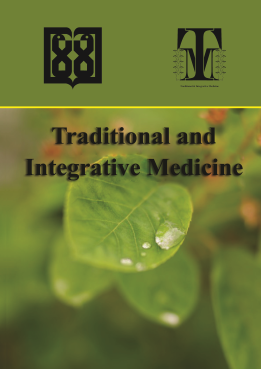A Review on Dalk (Massage) with Special Reference to the Prescribed Mediciations
Abstract
Dalk is one of the oldest forms of therapies in use since ancient times. It involves the manipulation of body tissues with hands, cloth or any suitable object. In Unani medicine, dalk is based on the principle of tanqiyah (expulsion) and imāla (diversion). In addition to the comforting feeling provided by human touch, massage has been demonstrated to have clinically significant physiological effects on the body. It increases blood flow, reduces stress and also has immediate sedative effects. Depending on the individual patient, different types of dalk are described which are used in combination with certain medicines or oils, or with bare hands for different disorders. Although largely a safe therapy, a few contraindications do exist, which are mainly advised for prevention of any adverse events. Unani physicians made significant advances into dalk and devised specific prescriptions for a large number of ailments. The prescribed formulations for dalk are mostly oils, but in certain conditions the decoction, paste, powder or extract of drugs is also prescribed, the basis of which is the individual mizāj (temperament) and also the disease.
Field T. Massage therapy. Med Clin North Am 2002;86:163-171.
Ernst E. The safety of massage therapy. Rheumatology 2003;42:1101-1106.
Ibn-e-Rushd. Kitab-al-Kulliyat. 2nd ed. CCRUM. New Delhi 1987; pp 346, 352-359.
Kabiruddin M. Tarjuma wa Sharah Kulliyat-e-Qanoon. Vol 1&2. Sheikh Mohd. Basheer and Sons. Lahore 1932; pp 150-154.
Ibne-Sina. Al-Qanoon Fil Tibb. Vol 1. Book Printers. Lahore 1992; pp 211-212.
Rapaport M, Schettler P, Bresee C. A preliminary study of the effects of repeated massage on hypothalamic-pituitary-adrenal and immune function in healthy individuals: a study of mechanisms of action and dosage. J Altern Complement Med 2012;18:789-797. URL: http://www.ncbi.nlm.nih.gov/pubmed/22775448
Field T. Massage therapy research review. Complement Ther Clin Pract 2014;20:224-229. URL: http://www.ncbi.nlm.nih.gov/pubmed/25172313
Goats GC. Massage - The scientific basis of an ancient art: Part 2. Physiological and therapeutic effects. Br J Sp Med 1994;28:153-156. URL: http://bjsm.bmj.com/content/28/3/153.full.pdf+html
Jager W, Buchbauer G, Jirovetz L, Fritzer M. Percutaneous absorption of lavender oil from a massage oil. J Soc Cosmet Chem 1992;43:49-54. URL: http://journal.scconline.org/pdf/cc1992/cc043n01/p00049-p00054.pdf
Nomikos NN, Nomikos GN, Kores DS. The use of deep friction massage with olive oil as a means of prevention and treatment of sports injuries in ancient times. Arch Med Sci 2010;5:642-645. URL: http://www.ncbi.nlm.nih.gov/pmc/articles/PMC3298328/pdf/AMS-6-5-642.pdf
Cambron JA. Side-Effects of Massage Therapy: A Cross-Sectional Study of 100 Clients. J Altern Complement Med 2007;13:793-796. URL: http://www.ncbi.nlm.nih.gov/pubmed/17983334
Vickers A, Zollman C, Reinish JT. Massage therapies. West J Med 2001;175:202-204.
URL:http://www.ncbi.nlm.nih.gov/pmc/articles/PMC1071543/pdf/wjm17500202.pdf
Jurjani A. Zakhira Khwar zam Shahi. Vol 2 (part-6). Munshi Nawal Kishore. Lucknow 1903; pp 39, 66, 74, 75, 82, 94, 304, 635.
Tabri R. Firdaus-Al-Hikmat. Vol 1&2. Sheikh Mohd. Basheer and Sons. Lahore 1996; pp 143, 153, 189-90, 218.
Khan A. Al-Ikseer. Vol 1. Daftar-ul-Masih. New Delhi 1904; pp 78, 261, 269, 293, 309, 316, 317, 322, 350, 416, 441, 468, 665, 785.
Majusi A. Kamil-us-Sana'ah. Vol 2. Munshi Nawal Kishore. New Delhi 1889; pp 302, 304, 326, 329, 331, 334, 379, 469, 504, 505, 506, 514.
Khan A. Haziq. Beeswin Sadi Publications Pvt. Ltd. New Delhi 1983; pp 25, 28,29, 42, 46, 47, 54, 57, 59, 67, 68, 72, 82, 204, 227, 228, 349, 354, 535, 536, 539, 543, 545, 549.
Razi Z. Al-Hawi Fil-Tibb. Vol 1. CCRUM. New Delhi 1997; pp 22-3, 29, 30, 31, 39, 40, 44, 72, 98, 99, 100, 105, 127, 137, 141, 142.
Razi Z. Kitab Al-Mansoori. CCRUM. New Delhi 1999; pp 205, 208, 320, 321, 322, 323, 324, 326, 345, 346, 348, 349, 358, 360, 378, 389, 393, 394.
Ibne-Sina. Al-Qanoon Fil Tibb. Vol 3 (part-1). Book Printers. Lahore 1992; pp 103, 119, 253, 278.
Razi Z. Al-Hawi Fil Tibb. Vol 4. CCRUM. New Delhi 1998; pp 18, 19, 24, 34, 43, 92.
Razi Z. Al-Hawi Fil-Tibb. Vol 5. CCRUM. New Delhi 1999; pp 123, 125.
Khan A. Al-Ikseer. Vol 2. Ash-Shifa. Faisalabad 1904; pp 1169, 1248, 1426, 1439, 1447, 1456, 1450.
Nikhat S, Fazil M. An Analytical Review on Nutool (Irrigation) Therapy. J Drug Deliv Ther 2015;5:1-4. URL: http://jddtonline.info/index.php/jddt/article/view/1127/649
Ibn-e-Sina. Al-Qanoon Fil-Tibb. Vol 3 (part-2). Book Printers. Lahore 1992; pp 161, 189.
Razi Z. Al-Hawi Fil Tibb. Vol 10. CCRUM. New Delhi 2002; pp 220, 223.
Ibn-e-Sina. Al-Qanoon Fil Tibb. Vol 1. Book Printers. Lahore 1992; p 211.
| Files | ||
| Issue | Vol 2, No 1, 2017 | |
| Section | Review Article(s) | |
| Keywords | ||
| Dalk Massage Therapy Morbid Matter | ||
| Rights and permissions | |

|
This work is licensed under a Creative Commons Attribution-NonCommercial 4.0 International License. |




